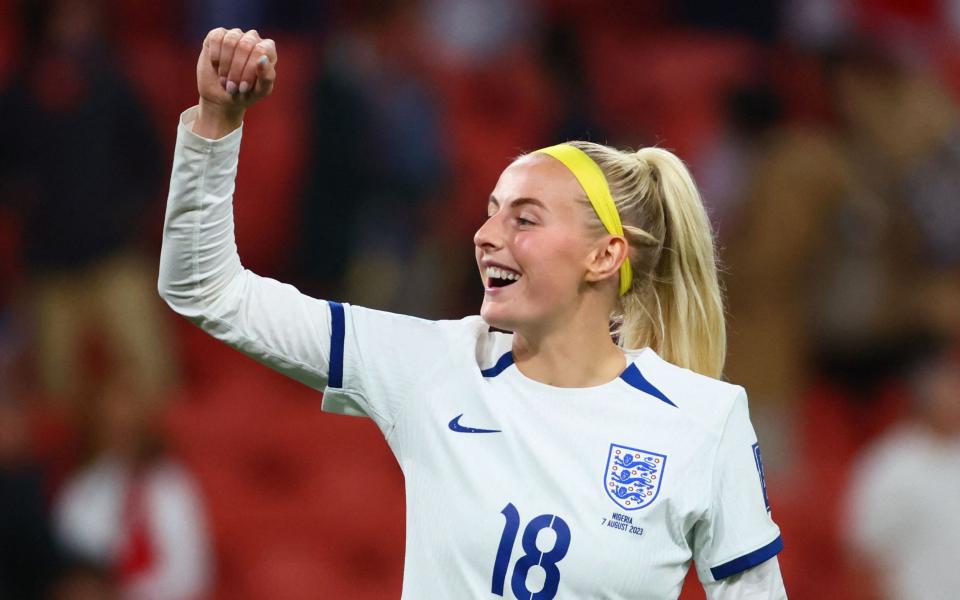Inside the cage that set England’s Chloe Kelly on the path to stardom

On the edge of a housing estate in west London, a concrete pitch surrounded by high fencing – a cage – is about to play host to a hotly contested game of football. Six-year-old Carter Nola has the ball; his little sister Ava deposits her pink backpack on the sidelines and steps up to the plate. She is ready to give chase, her Brentford kit showing signs of a lunchtime spillage, her navy socks pulled up over three-year-old knees.
For the families who live on the Windmill Park Estate, on the borders of Southall and Hanwell, this is a familiar scene. Over the years, the cage has been the site of many a battle royale, many a grazed knee and bruised teenage ego. It’s also the spot where, 20 years ago, another little girl stepped onto the pitch and began showing signs that one day she might just be a star.
If you were to take a stroll around the estate today, on the eve of the World Cup final, you could be in no doubt about which house belongs to the family of Lioness goal scorer Chloe Kelly. The entire façade of the terraced house where Kelly, 25, grew up with her parents, Jane and Noel, five older brothers and older sister, is covered in flags. All bases have been covered: there are six England flags, a flag for Queens Park Rangers (the local club where Kelly started her career) and one with the name “Kelly” emblazoned across it. There’s also one on the gate and a couple sticking out of the front lawn for good measure.

Kelly’s father, a machinery engineer, is out in Australia supporting her, along with one of her brothers and her boyfriend of four years, Scott. Back at home, Jane and her other children are getting the supplies in for today’s final. Supermarket bags filled with crisps are being ferried from the car to the house, party prep providing a good distraction from the nerves.
She is understandably reticent about talking to journalists, but the excitement and pride is written all over her face. “We can’t be there,” she says, “but we’ll be celebrating here.”
Kam Dhillon, who grew up with Kelly and still lives on the square, feels a bit sheepish about how he and the other lads on the estate used to treat her when they were young. “She used to want to come out and play with us, with the boys, and we’d be like, yeah, you go in goal.”
Dhillon’s sister, Sukhi, received similar treatment. “She was a girl, wasn’t she?” he protests. “Different times you know, times have changed.”
The Dhillons and the Kellys still live in opposite corners of a leafy square in the heart of the estate. In the evenings after school and on long Saturday afternoons the children would spill out into the square to play endless games of “hump to hump”. “There’s a hump on one side, a hump on the other side, and we used to put [Chloe] in goal on one side and my sister on the other. All of a sudden, look what she’s achieved.”

Dhillon, 37, an engineer, recalls how Kelly eventually graduated from the square to the cage, joining her five brothers and their friends on the pitch and running rings around the older boys in gritty games of seven a side. “It was quite competitive in the cage,” says Dhillon. “She used to play with us and we’re a bunch of lads and you know how it is, we used to bully her a bit and she used to trick us with her skills.
“Especially in the cage, because it’s so tight, she had to do skills, so she used to skill us out and obviously we’d be a laughing stock once she’d be dribbling past us.”
It’s those scrappy cage matches that Kelly credits with holding the key to her tenacity on the pitch. As a Manchester City forward and one of the Lionesses’ top strikers, she is often sent on to sustain an attack in the final quarter of a game, tasked with maintaining an England lead and trying for another goal. Kelly has an extraordinary confidence on the pitch – even when stepping up for a penalty she never looks rattled (amazingly, her 68.8mph penalty against Nigeria was faster than the most powerful strike of the 2022-23 Premier League, by West Ham’s Saïd Benrahma). There is a freedom to her football and a creativity which she puts down to getting “bounced off the cage” as a little girl, where she learned how to “get that yard on someone”.
“You had to hold your own against the boys, against players that didn’t respect you when you first walked in there,” she says. “They definitely do as soon as you leave.”
A fleet of older brothers helped too. “[It] definitely toughened me up a bit because if I was on the floor, it was ‘get up or you don’t play with us’.”

Her old neighbour, Sia, 27, remembers the mark Kelly made in those early matches on the square. “She was very full on and aggressive, because she was so passionate about it. […] She used to play here with my younger sister. And then we would go to cages and the community centre in summer holidays.
“She used to play with the guys because she was really good. She was predominantly the only girl playing football with them.”
Seeing such a familiar face up there on screen, carrying the hopes of the nation on her shoulders is special, says Sia, a sales director, who comes back to the estate every week to visit her family. “We don’t come from an amazing area; it’s quite deprived, especially when we were growing up. There weren’t many facilities or places to play so we just used to play out. […] It feels really weird seeing her on TV.”
Last summer, in the moments after she scored the winning goal against Germany, whipping her top off and running to the touchline to greet a roaring Wembley crowd, Kelly’s mind drifted back to the cage. “It was very powerful,” she told the Evening Standard. “I just celebrated the goal at Wembley as I would when I was a kid playing in the cages. That just reminded me of those moments.”
As a little girl, Wembley represented a kind of Mecca to Kelly. It helped that it was just a short ride on the 92 bus. On FA Cup final day she would head to the stadium, not to watch the match (she’d never have been able to afford a ticket) but simply to “buy a programme and then go back home”, having soaked up the atmosphere. Back at the cage she’d work on her skills, dreaming of the day when those roars coming from inside the stadium might be for her.
When she steps onto the pitch at Stadium Australia today, she will be a good deal more than a 20-minute bus ride away from the cage where she cut her teeth, but it doesn’t sound as if it will be far from her thoughts. “That little girl is still inside me…” she said last month. “I am going there as the little girl Chloe Kelly that just loves playing football.
“There will be so many kids that dream of playing at a World Cup, and that’s all I think about. One day, I was that little girl with this huge dream.”
Back at the cage on the Windmill Park Estate, Carter and Ava are taking a brief break from their game. Would Ava like to be a Lioness one day? Her brother chimes in. “I do!” He might struggle to convince Sarina Wiegman to let him on the team – what would he think if his little sister made it? He grins. “Fantastic.”

 Yahoo Sport
Yahoo Sport 





































